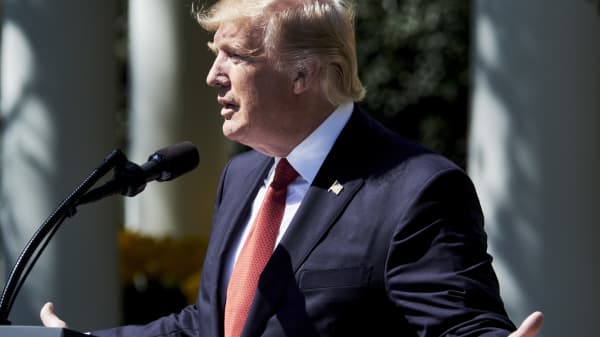Is the bloom coming off the rose in terms of the love affair between big business and the Trump administration?
Michelle Caruso-Cabrera made an interesting observation in a discussion we had this morning on CNBC's "Squawk Alley" (along with Carl Quintanilla, Jon Fortt, and Jimmy Pethokoukis). President Trump met yet again today with a bunch of CEOs, and before the meeting, commented that his administration "may eliminate" Dodd-Frank.
@CNBC: JUST IN: Trump, speaking to CEOs, says will have "pleasant surprises" on NAFTA; admin. is doing revamp of Dodd-Frank, may eliminate it
As Michelle pointed out, in the past, such comments moved markets, particularly bank stocks, and for understandable reasons. Dodd-Frank insists the banks hold more capital as a buffer against loan losses, capital that could otherwise be put to work earning profits. As a member of President Obama's economics team when Dodd-Frank was born, I viewed this (and still do) as a smart bit of insulation against the kind of systemic underpricing of risk that characterizes credit bubbles. But I get where the banks are coming from.
But this time, bank stocks didn't budge on the news. There are, of course, a lot of reasons why that might have occurred, but Michelle wondered if perhaps investors are picking up a credibility gap between what the President says and what he and his team can legislate.
If so, it's about time. It's easy to understand the positive expectations with which markets greeted the Trump administration, but at this point, one must question their ability to move any policies beyond executive orders (which do not require Congressional approval).
Health care is exhibit A. Remarkably, after seven years of inveighing against Obamacare, its opponents had done none of the policy work or coalition building required to move such a large, legislative change. Unsurprisingly, their plan, such as it was, blew up in about a week, and not because of Democratic opposition but because of Republicans!
Taxes are exhibit B. The health reform debacle didn't surprise me as conservatives don't know what they want to do in that space. But they're very clear what they want to do on taxes: cut them, preferably for those at the high-end of the income scale. And yet, they're lurching and flailing, allegedly dumping the tax plan they ran on, fighting about the border-adjustment tax, and now floating the idea of getting rid of the Social Security payroll tax and…get this…employers' ability to expense their wage costs! This is a huge, massive change—it's also a terrible idea, but I won't go there right now — but again, no analysis, no legwork, no coalition work.
Exhibit C would be infrastructure, but there's not even enough there to form an exhibit.
No question, financial markets are great aggregators of information. But at the same time, Wall Street can underestimate the challenge of getting things done down here in DC, and I firmly believe they've done so regarding the Trump agenda.
Jimmy P put it well: "At some point the sales job needs to end and there needs to be deliverables." We're fast approaching that point.
Commentary by Jared Bernstein, a senior fellow at the Center on Budget and Policy Priorities. He was a former chief economist and economic advisor to Vice President Joe Biden. He is the author of "The Reconnection Agenda: Reuniting Growth and Prosperity." Follow him on Twitter @econjared.
For more insight from CNBC contributors, follow @CNBCopinion on Twitter.




